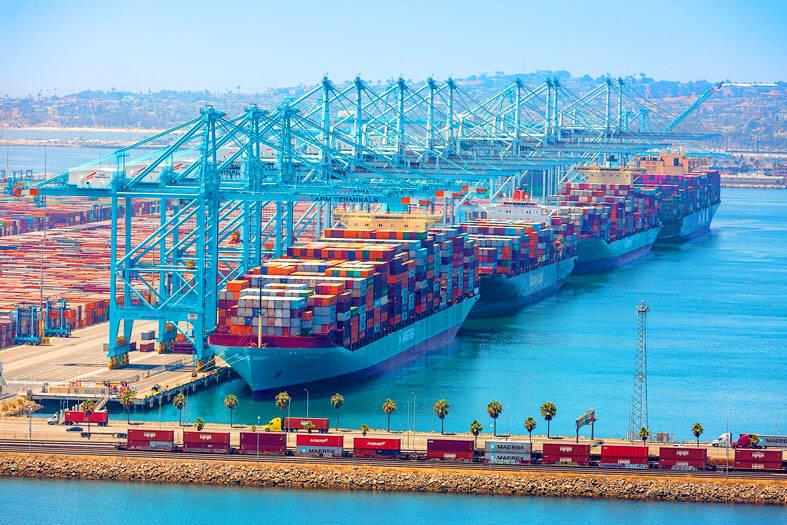Some Asian nations reacted with relief yesterday after US President Donald Trump announced tariffs that in some cases were lower than threatened, and delayed by a week to Thursday.
However, while countries such as Taiwan still hope to negotiate lower rates, uncertainty remains over transshipments and levies on Japanese cars.
Trump’s announcement does not cover export giant China — currently in negotiations on a trade deal ahead of an Aug. 12 deadline.

Photo: Bloomberg
The 19 percent levy for Thailand and Cambodia — fresh from border clashes that killed more than 40 people — is a let-off from the threatened 36 percent.
Thailand called it a “major success” and a “win-win approach aimed at preserving Thailand’s export base and long-term economic stability.”
The US trade deficit with Thailand reached US$45.6 billion last year. Its main exports include machinery, vehicles and auto components.
Cambodian Prime Minister Hun Manet called it “the best news for the people and economy of Cambodia to continue to develop the country.”
The major manufacturer of low-cost clothing for Western brands initially faced a tariff of 40 percent.
Neighboring Vietnam concluded an agreement with Washington at the beginning of last month on a rate reduced to 20 percent.
Washington also intends to impose a 40 percent surcharge on goods transported to the US via third countries — known as transshipments.
This could hurt in particular nations in Southeast Asia, whose production chains are closely linked to China.
Many Cambodian factories are Chinese-owned, and the White House has accused the kingdom of allowing Chinese goods to stop over on the way to US markets, skirting steeper rates imposed on Beijing.
A tariff of 15 percent agreed on last week between Japan and Washington — down from a threatened 25 percent — is due to be applied from Thursday.
However, Japanese auto exports were already being hit by a 25 percent rate, and Tokyo wants to know when this would be lowered too.
Japan “will continue to call on the US side promptly to take measures to implement the recent agreement, including reducing tariffs on automobiles and auto parts,” government spokesman Yoshimasa Hayashi said yesterday.

CALL FOR SUPPORT: President William Lai called on lawmakers across party lines to ensure the livelihood of Taiwanese and that national security is protected President William Lai (賴清德) yesterday called for bipartisan support for Taiwan’s investment in self-defense capabilities at the christening and launch of two coast guard vessels at CSBC Corp, Taiwan’s (台灣國際造船) shipyard in Kaohsiung. The Taipei (台北) is the fourth and final ship of the Chiayi-class offshore patrol vessels, and the Siraya (西拉雅) is the Coast Guard Administration’s (CGA) first-ever ocean patrol vessel, the government said. The Taipei is the fourth and final ship of the Chiayi-class offshore patrol vessels with a displacement of about 4,000 tonnes, Lai said. This ship class was ordered as a result of former president Tsai Ing-wen’s (蔡英文) 2018

‘SECRETS’: While saying China would not attack during his presidency, Donald Trump declined to say how Washington would respond if Beijing were to take military action US President Donald Trump said that China would not take military action against Taiwan while he is president, as the Chinese leaders “know the consequences.” Trump made the statement during an interview on CBS’ 60 Minutes program that aired on Sunday, a few days after his meeting with Chinese President Xi Jinping (習近平) in South Korea. “He [Xi] has openly said, and his people have openly said at meetings, ‘we would never do anything while President Trump is president,’ because they know the consequences,” Trump said in the interview. However, he repeatedly declined to say exactly how Washington would respond in

WARFARE: All sectors of society should recognize, unite, and collectively resist and condemn Beijing’s cross-border suppression, MAC Minister Chiu Chui-cheng said The number of Taiwanese detained because of legal affairs by Chinese authorities has tripled this year, as Beijing intensified its intimidation and division of Taiwanese by combining lawfare and cognitive warfare, the Mainland Affairs Council (MAC) said yesterday. MAC Minister Chiu Chui-cheng (邱垂正) made the statement in response to questions by Democratic Progressive Party (DPP) Legislator Puma Shen (沈柏洋) about the government’s response to counter Chinese public opinion warfare, lawfare and psychological warfare. Shen said he is also being investigated by China for promoting “Taiwanese independence.” He was referring to a report published on Tuesday last week by China’s state-run Xinhua news agency,

‘ADDITIONAL CONDITION’: Taiwan will work with like-minded countries to protect its right to participate in next year’s meeting, the foreign ministry said The US will “continue to press China for security arrangements and protocols that safeguard all participants when attending APEC meetings in China,” a US Department of State spokesperson said yesterday, after Beijing suggested that members must adhere to its “one China principle” to participate. “The United States insists on the full and equal participation of all APEC member economies — including Taiwan — consistent with APEC’s guidelines, rules and established practice, as affirmed by China in its offer to host in 2026,” the unnamed spokesperson said in response to media queries about China putting a “one China” principle condition on Taiwan’s